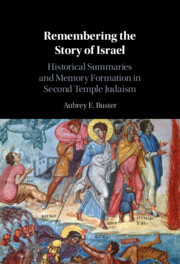Book contents
- Remembering the Story of Israel
- Remembering the Story of Israel
- Copyright page
- Contents
- Acknowledgments
- Introduction
- Part I Historical Summaries in the Hebrew Bible
- 1 Historical Summary as Commemoration
- 2 Historical Psalms as Acts of Commemoration
- 3 Historical Summaries as Commemoration in Chronicles
- 4 Praying History in the Wilderness
- Part II Historical Summaries in the Dead Sea Scrolls
- Appendix Historical Summaries in the Hebrew Bible
- Bibliography
- Index of Names
- Index of Scripture and Ancient Sources
- Subject Index
3 - Historical Summaries as Commemoration in Chronicles
from Part I - Historical Summaries in the Hebrew Bible
Published online by Cambridge University Press: 05 May 2022
- Remembering the Story of Israel
- Remembering the Story of Israel
- Copyright page
- Contents
- Acknowledgments
- Introduction
- Part I Historical Summaries in the Hebrew Bible
- 1 Historical Summary as Commemoration
- 2 Historical Psalms as Acts of Commemoration
- 3 Historical Summaries as Commemoration in Chronicles
- 4 Praying History in the Wilderness
- Part II Historical Summaries in the Dead Sea Scrolls
- Appendix Historical Summaries in the Hebrew Bible
- Bibliography
- Index of Names
- Index of Scripture and Ancient Sources
- Subject Index
Summary
In this chapter, I use frameworks drawn from the study of social memory in ancient Athens and the New Literacy to suggest two major ideas about the Chronicler’s use of the historical summary and the way that it is used to frame character speech about the past. First, the characters in Chronicles demonstrate their possession of a shared “functional memory” in their speech about the past, the narrative profile of which differs from the narrative emphasis of the Chronicler’s history itself. It is the covenant with the patriarchs, the exodus from Egypt, and the grant of the land, those events which, according to Japhet and others, are downplayed in the Chronicler’s narrative, that are presented in character speech as that which everyone knows. Second, forms of speech about the past also play a significant role in characterizing those who speak them. When kings speak, they often refer to the events contained within the schema of the historical summary, and when the people speak, they speak in psalms. It is at the point of the recitation of 1 Chron 16:8–36, a text that marks the celebration of the ark’s arrival in Jerusalem and David’s inauguration of psalmic rites of thanksgiving, that these two types of speech converge: there the Levites sing a composite psalm, comprised of portions of historical psalm 105, as well as Ps 96, to which the people respond with a refrain also preserved in Ps 106. The selection of this psalm by the Chronicler at this point in the narrative presents the people as participants in a commemorative ceremony facilitated by a psalm.
- Type
- Chapter
- Information
- Remembering the Story of IsraelHistorical Summaries and Memory Formation in Second Temple Judaism, pp. 121 - 153Publisher: Cambridge University PressPrint publication year: 2022



